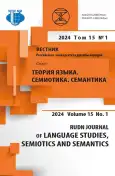The Interconnection of Substance, Structure and Function in High Systemicity Texts
- 作者: Valentinova O.I.1
-
隶属关系:
- RUDN University
- 期: 卷 15, 编号 1 (2024)
- 页面: 22-37
- 栏目: GENNADY PROKOPIEVICH MELNIKOV: TO THE 95TH ANNIVERSARY
- URL: https://journal-vniispk.ru/2313-2299/article/view/323637
- DOI: https://doi.org/10.22363/2313-2299-2024-15-1-22-37
- EDN: https://elibrary.ru/CGAZWQ
- ID: 323637
如何引用文章
全文:
详细
The purpose of the study is to establish the texts substance properties, to identify the features of its relationship with text structure and function and also to prove that the exclusion of substance as the most important, but not obvious for the current state of science, aspect of the system leading to semiotic distortion which cannot be improved. The study was carried out on the material of texts of different etiologies - religious and artistic, united by a functionally determined ultra-high degree of their levels consistency. The relevance of the work is determined by its significance in the development of a systematic method, the formation of the methodological foundations of systemic philology and the semiotics of culture. The systemic linguistics ideas developed in the works of W. von Humboldt, A.A. Potebnya, I.A. Baudouin de Courtenay, I.I. Sreznevsky, G.P. Melnikov, and the systemology developed by philosophers (K.F. Samokhvalov, G.P. Shchedrovitsky) and representatives of the natural and exact sciences (P.K. Anokhin, V.A. Engelgardt, L.V. Krushinsky, R.O. Bartini) did not have a direct impact on the systematic research of texts. Awareness of the significance of substance in the understanding of highly systemic texts begins to take shape in the exegesis and philosophy of art. Philology, focusing its interest mainly on fiction texts, contributes to the development of a systematic method with the emergence and development of ideas about the text dominant (yu.N. Tynyanov, R.O. yakobson), the diversity of its units (y. Mukarzhovsky), the discovery of the author’s image supercategory (V.V. Vinogradov), the identification of the method of estrangement (V.B. Shklovsky) and the universalization of it as a principle of assimilation of reality (V.B. Shklovsky, L.A. Novikov, M.L. Novikova). The comparison of different nature texts substance properties - against the background of the properties of the substance of language - allows us significantly refines the text substance understanding as the extreemly important system aspect.
作者简介
Olga Valentinova
RUDN University
编辑信件的主要联系方式.
Email: valentinova-ov@rudn.ru
ORCID iD: 0000-0002-8510-8701
SPIN 代码: 6986-9081
Scopus 作者 ID: 57193140621
Researcher ID: Х-8826-2019
Dr.Sc. in Philology, Full Professor, Professor of the Department of General and Russian Linguistics, Faculty of Philology
6, Miklukho-Maklaya str., Moscow, Russian Federation, 117198参考
- Mel’nikov, G.P. (1967). System Linguistics and Its Relationship to Structural Linguistics. In: Problems of Linguistics. Reports and reports of Soviet scientists at the 10-th International Congress of Linguists (Bucharest, August 27 — September 2, 1967). Moscow: Nauka. pp. 98–102. (In Russ.).
- Mel’nikov, G.P. (2003). System typology of languages: principles, methods, models. Moscow: Nauka. (In Russ.).
- Anokhin, P.K. (1971). Fundamental questions of the general theory of functional systems. Moscow. (In Russ.).
- Engel’gardt, V.A. (1984). Knowledge of the phenomena of life. Moscow: Nauka. (In Russ.).
- Bartini, R.L. (2009). World of Bartini: Collection of articles on physics and philosophy, A.N. Maslov (Ed.). Moscow: Self-education. (In Russ.).
- Mel’nikov, G.P. (1978). Systemology and linguistic aspects of cybernetics. Moscow: Radio. (In Russ.).
- Aristotle (1927). Poetics. Translation, introduction and notes by N.I. Novosadsky. Leningrad: Academia. (In Russ.).
- Lapshin, I.I. (1923). Aesthetics of Dostoevsky. Berlin: Obelisk. (In Russ.).
- Shpet, G.G. (1989). Aesthetic fragments. In: G.G. Shpet. Compositions. Moscow: Pravda. pp. 345–474. (In Russ.).
- Guyot, J.-M. (1900). Art from a sociological point of view. St. Petersburg: Znanie. (In Russ.).
- Losev, A.F. (1994). Dialectic of myth. In: A.F. Losev. Myth. Number. Essence. Moscow: Mysl’. pp. 5–216. (In Russ.).
- Florensky, P.A. (2002). The Pillar and Statement of Truth: An Experience of Orthodox Theodicy in 12 Letters. Moscow: Lepta. (In Russ.).
- Likhachev, D.S. (1945). National Self-Consciousness of Ancient Rus’: Essays on Russian Literature in the 11th— 17th Centuries, A.M. Deborin (Ed.). Moscow—Leningrad. (In Russ.).
- Dremov, A.F. (2001). Systemic theory of cases and its place in the evolution of views on case in linguistics of the XX century. In: Russian language: historical fate and modernity. International congress. Moscow: Moscow State University publ. pp. 164–165. (In Russ.).
- Kirov, E.F. (1997). Theoretical problems of language modeling. Kazan: Kazan State University. (In Russ.).
- Kirov, E.F. (1997). The phonology of the language. Ulyanovsk. (In Russ.).
- Kirov, E.F. (2017). Phonology of I.A. Baudouin de Courtenay as the basis of the theory of meaning. In: I.A. Baudouin de Courtenay and world linguistics. Proceedings and materials. Kazan: Kazan Federal University publ. pp. 109–112. (In Russ.).
- Lipatova, T.V. (2015). To the question of the plans of language activity. RUDN Journal of Language Studies, Semiotics and Semantics,1, 32–36. (In Russ.).
- Lutin, S.A. (2006). The origins and essence of the determinant approach to language as a system Russian Language Studies, 2(8), 13–21. (In Russ.).
- Novikova, M.L. (2020). Ontology of the art of the poetic word and estrangement. Moscow: Ekon-Inform. (In Russ.).
- Rybakov, M.A. & Trubeeva, E.V. (2016). The category of case in the works of E.D. Polivanov. In: XI Polivanov Readings. Smolensk, SmolGU. pp. 214–217. (In Russ.).
- Rybakov, M.A. & Trubeeva, E.V. (2015). Semantic potential of grammatical ways of case registration. Philological sciences. Questions of theory and practice, 3(45), 151–153. (In Russ.).
- Rybakov, M.A. (2012). The grammatical category of case as an object of typological. RUDN Journal of Language Studies, Semiotics and Semantics, 3, 6–41. (In Russ.).
- Fedosyuk, M.yu. (2012). G.P. Melnikov’s concept and discussion about the Russian language picture of the world. Political Linguistics, 2(40), 11–12. (In Russ.).
补充文件









